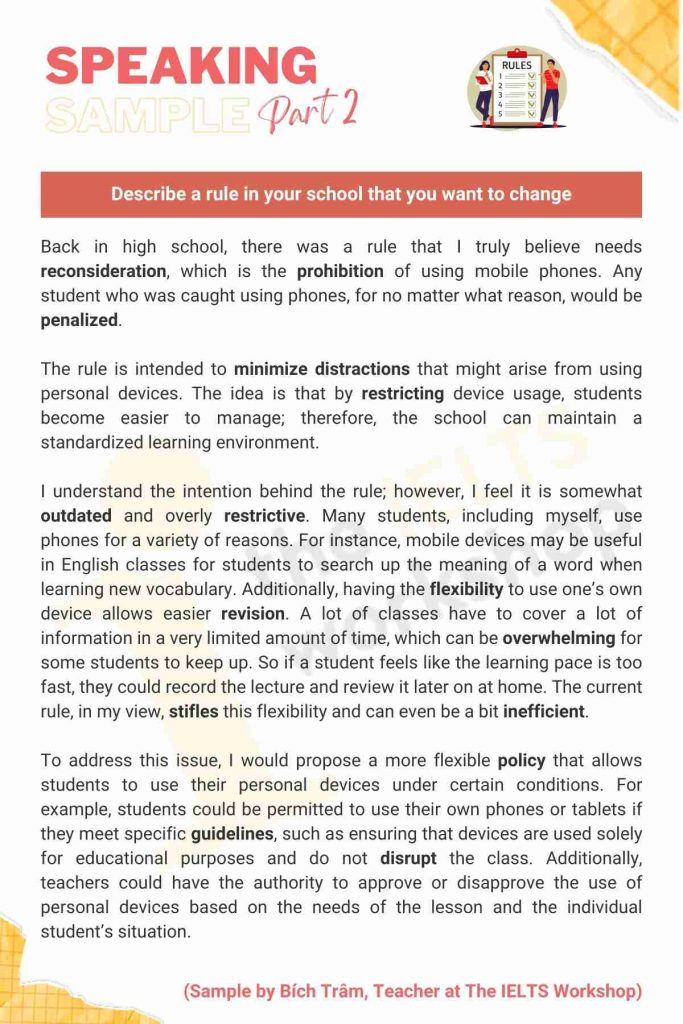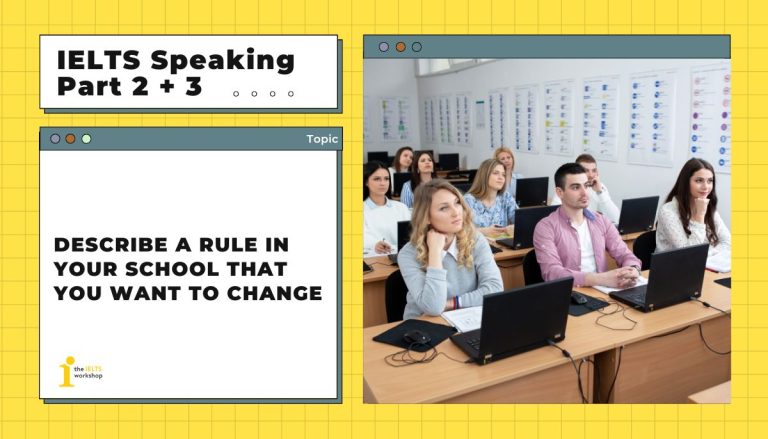Trong chuyên mục giải đề IELTS Speaking kỳ này, cùng tham khảo bài mẫu của cô Bích Trâm từ The IELTS Workshop với chủ đề: “Describe a rule in your school that you want to change”. Cùng tham khảo tự vựng và các cấu trúc ghi điểm nhé.
Part 2: Describe a rule in your school that you want to change
Describe a rule in your school that you want to change
You should say:
What is the rule about
Why you don’t like it
What would you do to change the rule
Dưới đây là bài mẫu cho topic “Describe a rule in your school that you want to change”.
1. Bài mẫu (Sample)

2. Từ vựng (Vocabulary)
- Reconsideration (n) Sự xem xét lại
- Prohibition (n) Lệnh cấm
- Penalize (v) phạt
- Minimize (v) Giảm thiểu
- Distraction (n) Sự phân tâm
- Restricting (n) Hạn chế
- Outdated (adj) Lỗi thời
- Restrictive (adj) Hạn chế
- Stifle (v) Ngăn chặn
- Flexibility (n) Tính linh hoạt
- Revision (n)Sự ôn tập
- Overwhelming (n) Quá tải
- Inefficient (adj) Kém hiệu quả
- Policy (n) Chính sách
- Guidelines (n) Hướng dẫn
- Disrupt (v) Gây gián đoạn
Part 3
Why should schools have laws for students?
Do parents have rules for children at home?
Is it normal for people to break the rules?
If someone breaks the small law, how should they be punished?
1. Why should schools have laws for students?
There are various reasons why laws are needed in an educational setting. Firstly, schools need rules for students to keep things organized and ensure a good learning environment. Rules help prevent problems and keep students safe in order to stop issues like bullying. Moreover, rules make sure that everyone is treated fairly and no one is favored over others. In short, rules help create a safe and fair atmosphere where students can focus on learning and growing. This structure is important for both their education and personal development.
- Educational setting (n) – Môi trường giáo dục
- Favored (v) -Được ưu ái
- Organized (adj) – Có tổ chức
- Personal development (n) – Phát triển cá nhân
2. Do parents have rules for children at home?
Certainly, in fact, these rules are important for creating structure and consistency in daily life. For example, rules about bedtime and homework time help children develop good habits and manage their time effectively. Additionally, rules such as doing chores teach children about responsibilities. This helps them learn the importance of contributing to the household and working as a team. Rules also promote respect within the family. Furthermore, guidelines about screen time and curfews help protect children from potential dangers and encourage healthy habits. Overall, these rules are essential for guiding behavior and helping children grow into responsible, well-adjusted adults.
- Consistency (n) – Tính nhất quán
- Chores (n)– Công việc nhà
- Responsibilities (n) – Trách nhiệm
- Contribute (v) – Đóng góp
- Household (n) – Hộ gia đình
- Screen time (n) – Thời gian sử dụng thiết bị điện tử
- Curfews (n)– Giờ giới nghiêm
- Potential dangers (n) – Nguy cơ tiềm tàng
- Essential (adj) – Cần thiết
- Well-adjusted (adj) – Tốt
3. Is it normal for people to break the rules?
Yes, it is quite normal for people to break rules from time to time. Human behavior is complex, and sometimes people may not follow rules due to various reasons, such as misunderstanding, disagreement, or situational pressures. For example, someone might break a traffic rule because they are in a hurry or are unsure about the regulation. While occasional rule-breaking is common, it’s important for individuals to understand the reasons behind the rules and the consequences of not following them. Breaking rules can lead to problems, such as safety issues or unfair treatment of others. Therefore, while it is normal, it is crucial to address and correct rule-breaking to maintain order and fairness in society.
- Situational pressures (n) – Áp lực tình huống
- Regulation (n) – Quy định
- Unfair treatment (n) – Đối xử không công bằng
- Address and correct (v) – Giải quyết và chỉnh sửa
- Maintain order (v) – Duy trì trật tự
4. If someone breaks the small law, how should they be punished?
If someone breaks a minor law, the punishment should be fair and proportionate to the offense. For small infringements, educational measures or warnings might be appropriate. For example, if someone is caught littering, a community service requirement or a small fine could be effective in addressing the behavior. The goal should be to correct the behavior rather than just punish. Providing a clear explanation of why the rule is important and how to avoid similar mistakes in the future can help prevent repeat offenses. Overall, the punishment should encourage responsible behavior and respect for the law, while also considering the context and intent behind the offense.
- Punishment (n) – Hình phạt
- Proportionate (adj) – Tương xứng
- Offense (n) – Hành vi vi phạm
- Infringements (n) – Sự vi phạm
- Educational measures (n) – Các biện pháp giáo dục
- Community service (n) – Dịch vụ cộng đồng
Bài mẫu bởi cô Bích Trâm – Giáo viên The IELTS Workshop
Trên đây là bài mẫu cho topic: Describe a rule in your school that you want to change. Các bạn có thể tham khảo Bộ đề dự đoán IELTS Speaking quý 3/2024 của The IELTS Workshop tại đây!
Ngoài ra, khoá học Senior của The IELTS Workshop sẽ giúp bạn nâng cao kỹ năng cũng như xây dựng chiến lược trả lời câu hỏi, tham khảo ngay nhé!!









